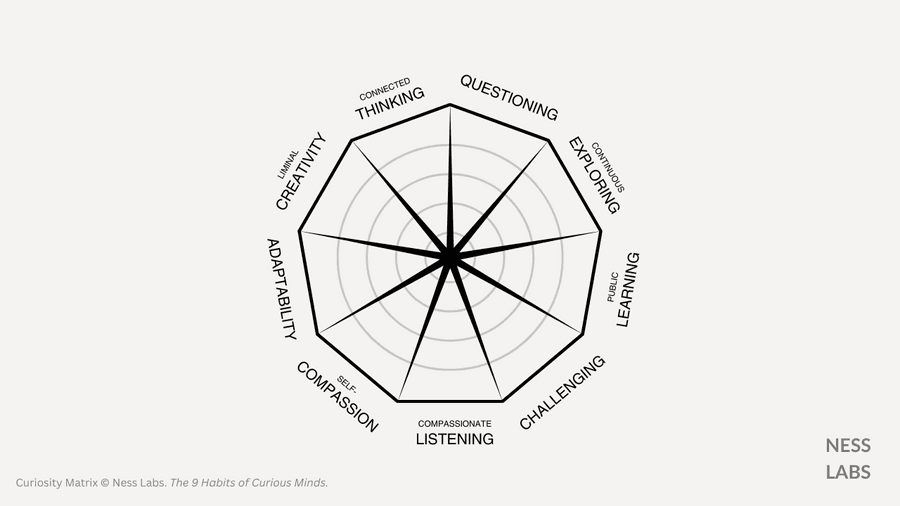9 Habits of a Curious Mind
Curated from: nesslabs.com
Ideas, facts & insights covering these topics:
12 ideas
·13.2K reads
61
Explore the World's Best Ideas
Join today and uncover 100+ curated journeys from 50+ topics. Unlock access to our mobile app with extensive features.
Curiosity as an Innate Human Trait
- Curiosity, observed in all healthy babies and young children, serves as an adaptive mechanism guiding us to explore and seek new experiences.
- While universal, the degree and focus of curiosity vary significantly among individuals and can evolve throughout one's lifespan.
- Research highlights that systematically curious individuals, characterized by adventurousness and creativity, tend to be less risk-averse and actively pursue exploration.
- This diverse group shares common habits that foster personal and professional growth, making curiosity a lifelong journey of discovery and development.
95
1.6K reads
1. Seeking liminal spaces
- Curious minds are not only comfortable in the in-betweens, they actively seek out those transitional moments of personal growth.
- Rather than racing through the uncomfortable phase of not-knowing, they enjoy exploring the gap between what they know and what they don’t know.
- They can fall in love with problems and revel in what poet Mary Oliver calls “the pleasure of mystery.”
99
1.27K reads
2. Forming connections between ideas
- Instead of thinking about the world in a linear way, curious minds think in maps.
- They practice networked thinking and combinational creativity, and find delight when discovering an unexpected connection between two ideas.
- Their mind is a garden and the world a giant playground where ideas can seed their imagination.
102
1.13K reads
3. Asking questions
- For curious minds, every interaction is an opportunity to learn.
- Exchanging good questions is one of their favorite modes of communication.
- They not only ask questions to others during conversations, but also to themselves when consuming content.
- Some of them even keep a list of their favorite questions.
99
1.01K reads
4. Exploring new interests
- Because the world is full of potential curiosity attractors, curious minds have many interests which may not always overlap.
- However, it can be hard to channel their curiosity, and the fleeting urge to explore something new just for the sake of novelty can sometimes lead to distraction.
93
928 reads
5. Learning in public
- Although it can be scary, curious minds make it a point to admit when they don’t know.
- Instead of trying to be the expert in the room, they consider themselves lifelong learners.
- They are willing to be wrong. And they generously share what they learned with fellow curious minds.
99
919 reads
6. Challenging the default
- Anything that seems obvious on the surface can become a topic of investigation for curious minds.
- They wonder about the reality of default definitions and test their assumptions through experimentation.
93
893 reads
7. Listening with compassion
- Because they want to deeply understand the world and others around them, curious minds tend to be empathetic.
- They try to listen without judgment and to embody the words of Thích Nhất Hạnh:
“If we cannot listen mindfully, we cannot practice right speech. No matter what we say, it will not be mindful, because we’ll be speaking only our own ideas and not in response to the other person.”
105
843 reads
8. Approaching difficult experiences with self-compassion
- Any thought or emotion can be the seed of self-discovery for curious minds.
- Even without knowing the scientific terms for these habits, they practice metacognition to interrogate the thoughts that arise in their mind and interoception to understand the sensations that arise in their body.
- They do not try to suppress these signals, but treat them as a helpful source of information.
93
817 reads
9. Welcoming the unpredictable
- For curious minds, the fact that the world keeps on changing is a feature, not a bug.
- They believe that their response determines how much disruptions affect them, and they choose to respond with curiosity.
- They surf with chaos to not only survive, but to thrive in chaotic times.
93
700 reads
Benefits of Curiosity and How to Nurture It
🔍 Curiosity has many benefits - it keeps you young, helps you learn, and strengthens relationships. Injecting curiosity into your life has lasting positive effects.
- 🧭 Being curious in all aspects of life can be nurtured by anyone.
- 🧬 Although genes might play a role, curiosity is not limited by them.
- 🤔 Start by exploring the nine habits in the Curiosity Matrix.
- 🤓 Ask yourself: How often do I practice these habits? Is there one I can start incorporating into my daily life today?
96
694 reads
IDEAS CURATED BY
Content Curator | Absurdist | Amateur Gamer | Failed musician | Successful pessimist | Pianist |
CURATOR'S NOTE
As an adaptive trait, curiosity draws us to seek information and new experiences. It’s how we learn about ourselves, others, and the world. So why should you and I be curious at all? let's explore...
“
Similar ideas
16 ideas
A Curious Mind Summary
fourminutebooks.com
4 ideas
Why Curiosity Matters
hbr.org
7 ideas
How to Cultivate Your Curiosity
betterhumans.pub
Read & Learn
20x Faster
without
deepstash
with
deepstash
with
deepstash
Personalized microlearning
—
100+ Learning Journeys
—
Access to 200,000+ ideas
—
Access to the mobile app
—
Unlimited idea saving
—
—
Unlimited history
—
—
Unlimited listening to ideas
—
—
Downloading & offline access
—
—
Supercharge your mind with one idea per day
Enter your email and spend 1 minute every day to learn something new.
I agree to receive email updates












